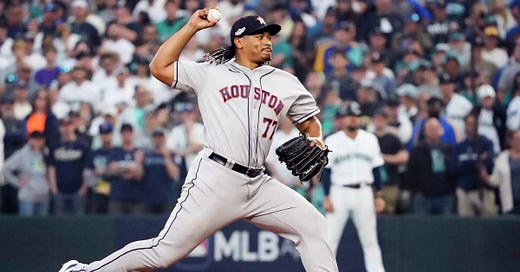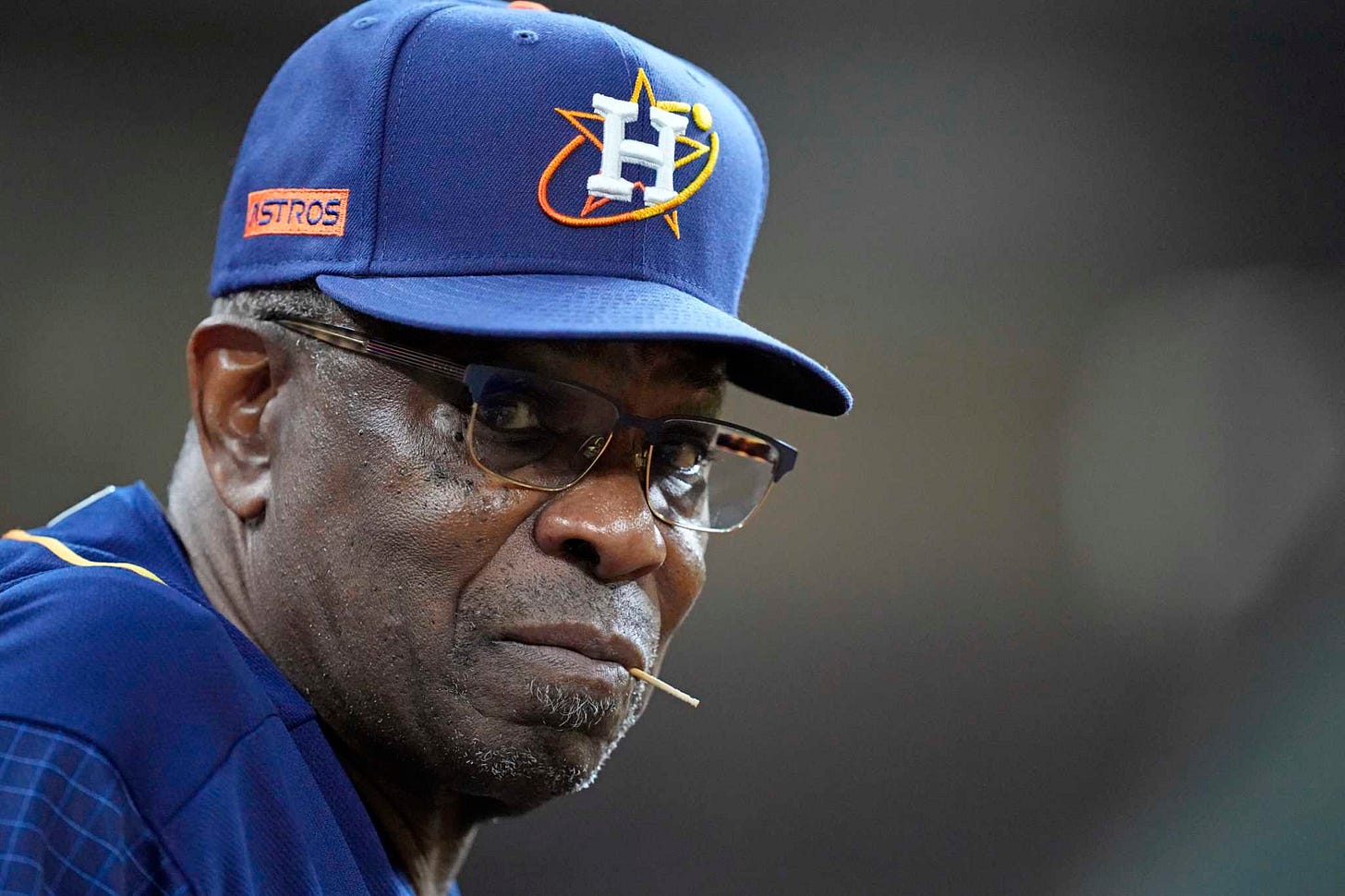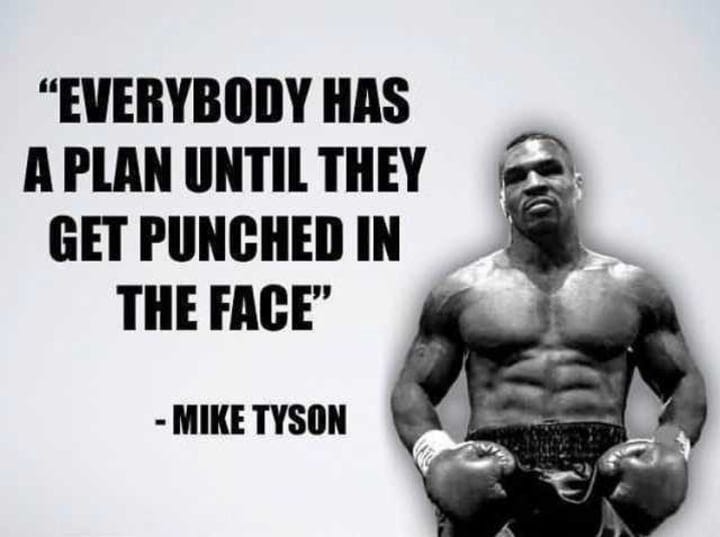The Pitching Staff Never Wavered: My ALDS Game 3 Analysis
The pitching staff was awesome yesterday; the Astros outhomered the Ms and cut down on allowing walks in Game 3. Dusty Baker has confidence in his bullpen arms, and managed like it.
For 17 innings, allowing a single run would have ended the game. And for 17 innings, they didn’t allow one. And then in the 18th, they had the slimmest of margins—and they didn’t allow a run either, much less a base runner.
The Astros won the 106 games and the American League West on the back of their pitching and defense. They allowed fewer runs this season than any team in the history of the franchise.
And on Saturday afternoon and night in Seattle, that ability was tested in the longest game in postseason history. The pitching staff never wavered.
The box score tells the tale of this game for Astros pitching. Eight pitchers threw 262 pitches across 64 Mariner plate appearances. They allowed only 10 Mariners to reach base—seven by base hit and three by walk. No Mariner reached third base after the second inning, and, most importantly, none reached home to score a run.
The Astros defense was oddly shaky on Saturday, as three of the Mariners singles came on plays it looked like the Astros defense should have made.1 Yet the Astros pitchers never seemed rattled. And more importantly, they reduced the need for their defenders to make plays behind them by striking out 22 Mariners—34% of the batters they faced in Game 3.
The headline for my ALDS preview read “Can the Astros Outslug the M's? Can the M's Walk Their Way to a Series Win?” And those two elements—who hits more home runs and can the Astros keep the Mariners from drawing walks—were indeed important keys to understanding how the Astros won Game 3 in particular, and the series overall.
The Mariners did not homer in either Game 2 or 3, and the Astros outhomered them 6-2. Hitting home runs is always a good thing and allowing them always a bad thing. Hitting/allowing homers is more important in modern baseball where batting average has declined and strikeout rates have increased. And it is even more important in playoff baseball, where there are a larger concentration of the best pitchers on the mound.
The Mariners were unable to hit home runs, and had to rely on stringing together base hits. It didn’t work.
That it did not work should not be that surprising; the Astros held opponents to a .212 batting average in the regular season. They were even better in the ALDS, holding the Mariners to a .195 batting average.
It is also difficult to score runs when you do not get free bases. The Mariners were the third best team in the majors at drawing walks in the regular season. And the weakest part of the Astros pitching staff is giving up walks—they ranked 13th best in baseball in walk rate.
But on Saturday, the Mariners drew only three walks against the Astros—a pair to leadoff the second inning against Lance McCullers in the 2nd and two out walk by Julio Rodriguez against Hunter Brown in the 13th.
Astros pitchers kept the Mariners off the basepaths in Game 3. The Mariners were not able to get a clutch hit, as they went 0 for 8 with runners in scoring position. But the denominator is almost as important as the numerator in that statement. In 18 innings, the Mariners had only 8 at bats with a runner in scoring position, thanks in large part to the ability of Astros hurlers to cut down on their walk rate.
#Throw Strikes. They did.
Usually in long extra inning games, we can identify a handful of key moments in the game where a manager makes a big decision that has a big impact on the result—or at least leads to lots of discussion about that decision.
There were very few decisions that Dusty Baker made yesterday in 18 innings that prompted such discussion. Why?
One important reason for that is that Dusty managed the game yesterday smoothly. That is mostly defined by the fact that used his bullpen in a linear fashion and started each of his seven relievers with a clean inning. And none of his top five arms in the bullpen got more than an inning.
This choice reflected two things. First of all, it was not an elimination game for the Astros, so Baker did not have to push his best relievers to the brink to win this game. If they had played today, he would have had each of those top five relievers available.
But Baker could also manage in such a smooth fashion because of the talent in his bullpen. Consider the relievers he chose not to use before extra innings—Bryan Abreu and Ryne Stanek. They had ERAs of 1.94 and 1.15 respectively, and FIPs of 2.12 and 3.02. And that’s your fourth and fifth best reliever.
Dusty Baker could manage his bullpen in such an unruffled fashion in large part because the excellent talent in the Astros pen gives him confidence in any arm that he puts out there.
And I heard echoes of that confidence in the quotes from bullpen arms after yesterday’s game.
Ryne Stanek described the shutout as “a testament to what the bullpen has done all year. Pass the ball off to the next guy and get the job done,”
Hunter Brown said the top thing on his mind was “execute for the guys that are coming in after you and the guys that executed before you. You just want to keep that train rolling.”2
These quotes reflected this confidence in each other member of the bullpen. Both Stanek and Brown are aware of the talent around them and want to contribute to that talent. And yesterday, each of the two did.
Dusty’s confidence in his bullpen is based on a season’s worth of excellent performance from his bullpen arms. The confidence was reflected in how he used the pen yesterday, and was reinforced by their standout performance.
The most dramatic moment in Game 1 was when Mariner manager Scott Servais chose to bring in one of his starters—Robbie Ray—to face Yordan Alvarez in the highest leverage plate appearance of the game. You know what happened.3
In a press conference the day after Game 1, Scott Servais defended the decision to use Ray:
We have a really good process. It's something that we have developed over time, specifically the last couple years, in our decision-making. ... We made the decision we made based on the players we had available, based on the numbers and the information I had available -- and stand by it.
Except Servais didn’t believe what he said. In Game 2, he did not bring in Ray to face Alvarez with two outs in the bottom of the 8th inning. Instead, intentionally walked Alvarez, which forced Jeremy Pena to 2nd base. He scored one pitch later on an Alex Bregman single.
In Game 3, Servais had 5 occasions after starter George Kirby was pulled where he could have brought Ray in to face Alvarez, but chose not to. Heck, in the 16th, he brought in a different left handed pitcher (Matt Boyd) to get a platoon advantage on Alvarez and Kyle Tucker two batters later.
Servais finally brought in Ray in the 18th, but not to face Alvarez. He let right handed pitcher Penn Murfee do that. Ray entered to face Tucker.
The choice to abandon the Robbie Ray plan by the Servais and the Mariners may reflect internal disagreement about that plan.
And it might also reflect the the truism credited to 20th Century realist philosopher Mike Tyson.
I don’t think I can go far enough to morally support the Yankees tonight in Game 4 against the Guardians. But if they won tonight in their own 18 inning game to force a Game 5 tomorrow, I wouldn’t object.
The JP Crawford single in the 5th that Yordan Alvarez dove for; the Eugenio Suarez infield single in the 9th that Altuve could not glove; the Carlos Santana single in the 12th that Yuli Gurriel thought would be gloved by Altuve.
Both quotes come from Chandler Rome’s gamer from last night. Hat tip to Chandler.
And yes, I know you want to see it again. So do I.






